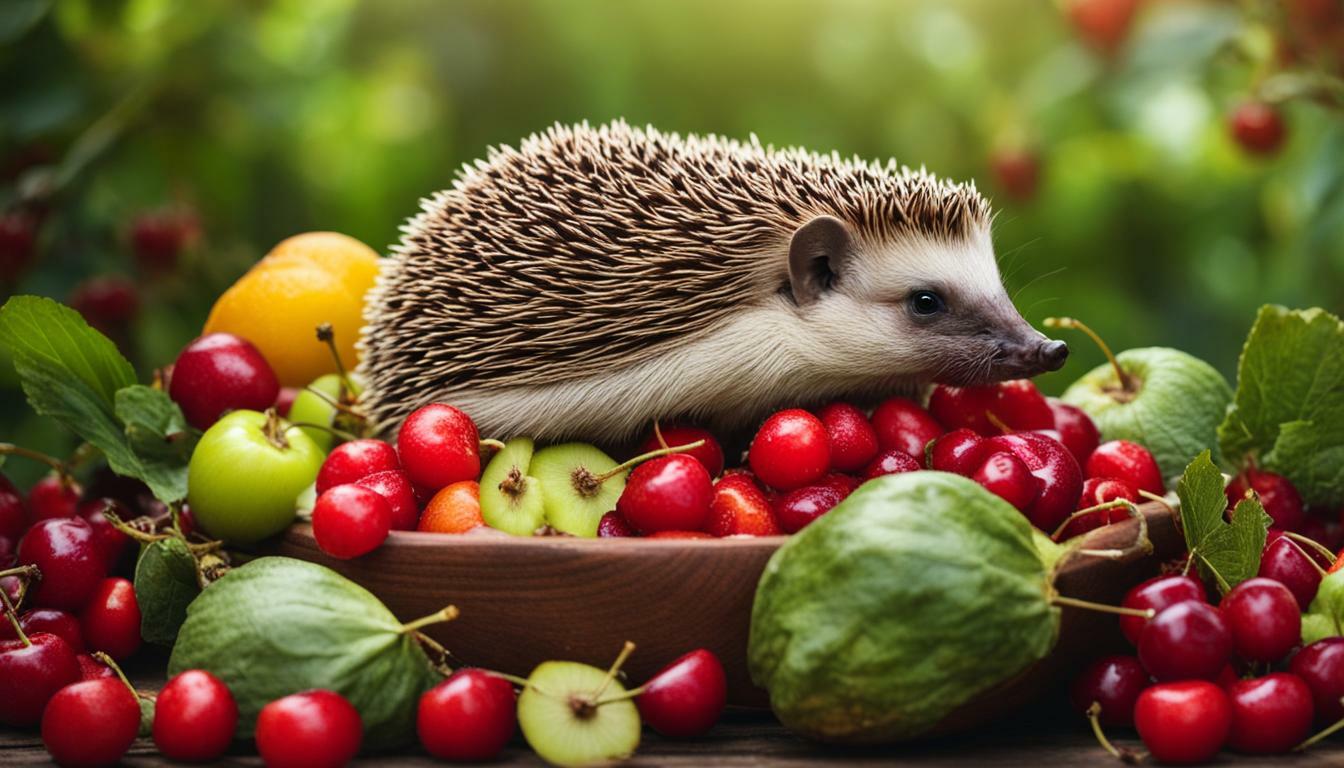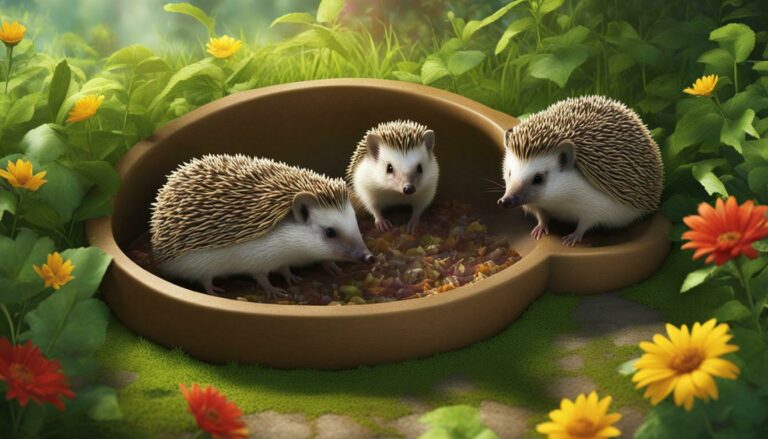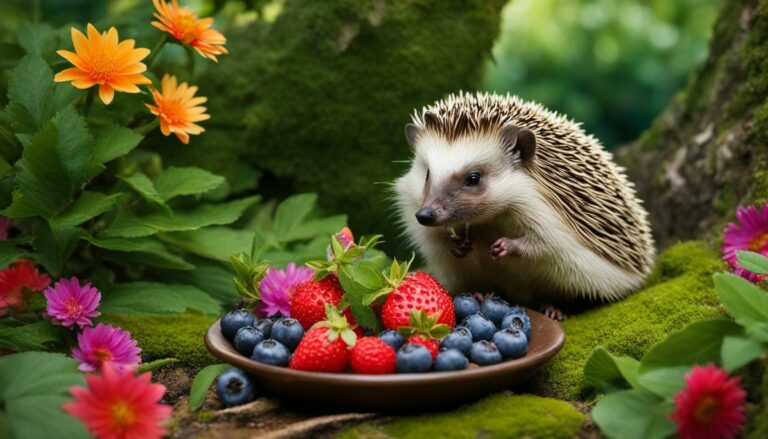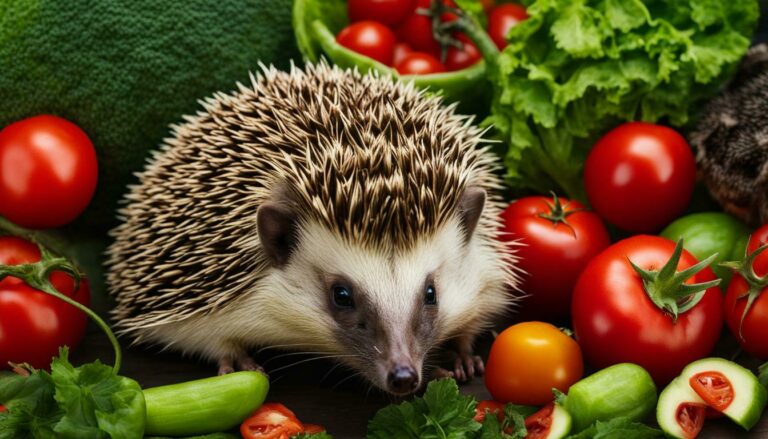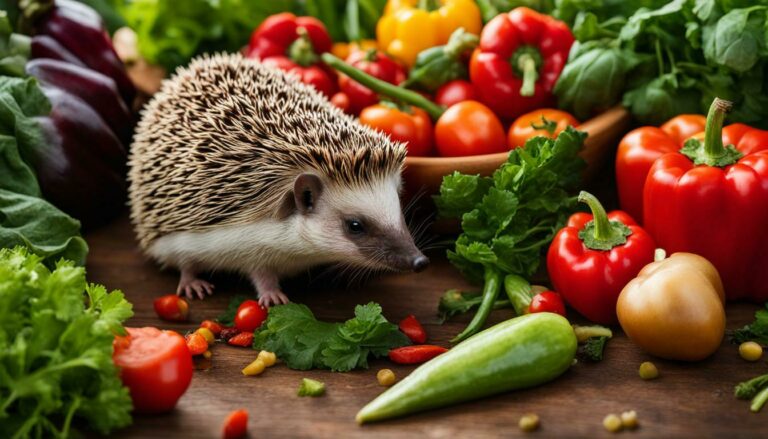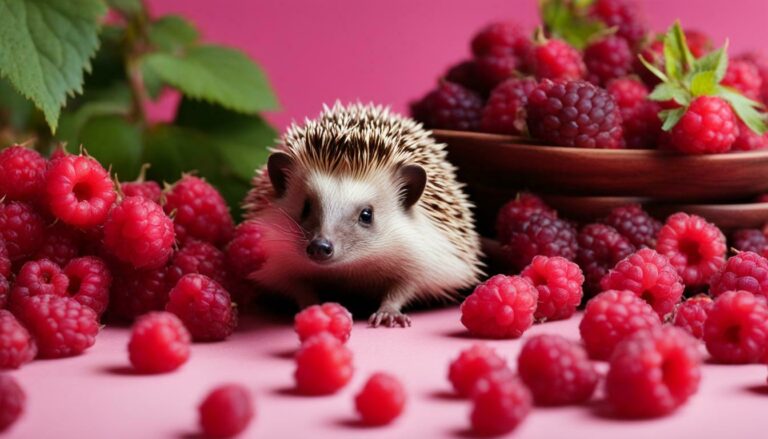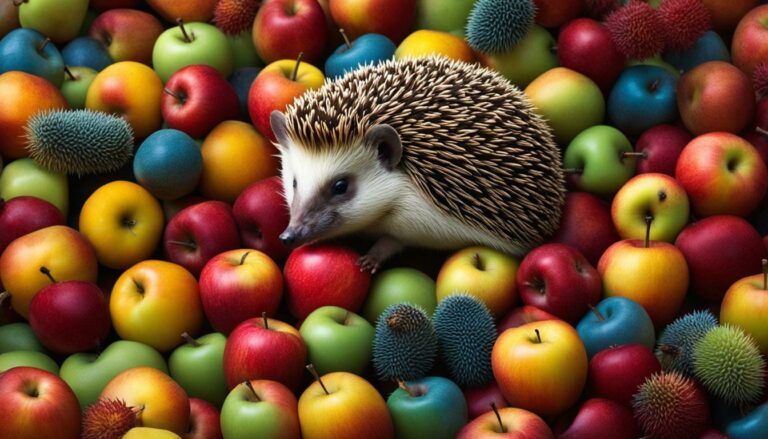Can Hedgehogs Eat Cherries? A Comprehensive Guide
Hedgehogs are an increasingly popular pet in the United States, but people still have many questions about their diet. Most owners know their hedgehog loves fruit, but one of the most common questions we get is can hedgehogs eat cherries. The short answer is yes, hedgehogs can eat cherries and will probably enjoy them. However, before making them a regular part of your pet’s diet, there are some things to consider. Keep reading while we look at the benefits and potential hazards of cherries so you can be better informed.
Key Takeaways:
- Hedgehogs can eat cherries, but precautions need to be taken due to potential hazards.
- Cherry seeds contain cyanide and should be removed before feeding cherries to hedgehogs.
- The skin of cherries can present a choking hazard and should be removed if possible.
- Cherries contain sugar, so portion control is important to prevent weight gain and other health problems.
- Cherries provide hydration, protein, vitamin A, vitamin C, and fiber, which can benefit hedgehogs’ health.
- To feed cherries to hedgehogs, they should be washed, pitted, and cut into small pieces.
- Other fruits and foods that hedgehogs can safely eat include apples, bananas, kiwi, melons, and more.
- Citrus fruits, grapes, raisins, and dried fruits should be avoided.
- Hedgehogs should have a balanced diet that includes high-quality cat food as their primary source of protein.
Are Cherries Safe for Hedgehogs?
Let’s take a look at the components that make up this fruit we humans enjoy so much, but that may pose a few risks to your pet.
Seed:
Cherry seeds contain the potentially deadly toxin cyanide. This toxin is not only harmful to hedgehogs and other animals; it’s also poisonous to humans. Most people don’t realize the seeds are dangerous because we don’t eat them, so you will need to remove any seeds from the cherries you provide to your pet.
Skin:
The skin of cherries is not toxic to your hedgehog, but it does present a choking hazard. The hedgehog has a tiny mouth and throat. The skin of several fruits can get lodged in it, so it’s better to remove it before serving, when possible, to minimize risk.
Sugar:
Cherries, like many other fruits, contain quite a bit of sugar. One cup of cherries contains more than 13 grams of sugar, and while you will only be serving a fraction of this amount, they can still lead to weight gain, tooth decay, and other health problems for your hedgehog.
| Components | Effects on Hedgehogs |
|---|---|
| Seed | Potentially deadly toxin cyanide. Remove all seeds before serving. |
| Skin | Choking hazard. Remove skin to minimize risk. |
| Sugar | Can lead to weight gain, tooth decay, and other health problems. |
Water:
Cherries contain plenty of water, which can help your pet stay hydrated, especially if it hasn’t been drinking enough since the hedgehog will likely be more attracted to the fruit than the water bottle. However, too much water at one time could lead to diarrhea.
Protein:
Cherries contain protein that can help provide your hedgehog with energy and the building blocks for strong muscle.
Vitamin A:
Cherries contain vitamin A, which can help the blood transport oxygen better.
Vitamin C:
Cherries are extremely high in vitamin C, like many fruits, and this important nutrient is a powerful antioxidant that works to boost the immune system. It also helps prevent scurvy, helps build strong bones, and helps relieve allergy symptoms. Vitamin C is also vital in collagen production, which is important tissue in animals that supports bone and joint health.
Fiber:
Another benefit to feeding your pet hedgehog cherries is that it provides fiber. Fiber is important because it can help balance your pet’s digestive system, reducing the frequency of constipation and diarrhea.
| Components | Effects on Hedgehogs |
|---|---|
| Water | Can help with hydration but too much can cause diarrhea. |
| Protein | Provides energy and muscle building. |
| Vitamin A | Helps with oxygen transport. |
| Vitamin C | Boosts immune system, prevents scurvy, and promotes bone and joint health. |
| Fiber | Helps balance digestive system, reduces constipation and diarrhea. |
Overall, cherries can be enjoyed by hedgehogs in moderation. However, it is important to remove the seeds and skin to prevent potential hazards. The sugar content should also be monitored to avoid weight gain and other health issues. Cherries can provide hydration, protein, vitamins, and fiber, which are beneficial to your pet’s well-being. Remember to always consult with a veterinarian before introducing any new foods into your hedgehog’s diet.
Benefits of Cherries for Hedgehogs
Cherries can provide several benefits to your hedgehog’s health and well-being. They are not only delicious but also packed with essential nutrients that can support your pet’s overall health. Here are some of the key benefits of including cherries in your hedgehog’s diet:
- Rich in Water: Cherries are a hydrating fruit that can help keep your hedgehog properly hydrated. This is especially important if your hedgehog is not drinking enough water from its water bottle. However, it’s crucial to avoid feeding your hedgehog too much water at once, as it can lead to diarrhea. So, offer cherries in moderation to maintain a healthy balance.
- Good Source of Protein: Cherries contain proteins that can provide your hedgehog with energy and contribute to the development of strong muscles. Protein is an essential nutrient for hedgehogs, and including cherries in their diet can help ensure they receive an adequate amount.
- High in Vitamins: Cherries are particularly rich in vitamins A and C. Vitamin A is essential for improving blood oxygen transport, while vitamin C acts as a powerful antioxidant that boosts the immune system. These vitamins also contribute to bone and joint health and help relieve allergy symptoms in hedgehogs.
- Source of Fiber: Cherries can provide fiber, which is important for maintaining a healthy digestive system in hedgehogs. Fiber helps regulate bowel movements and can reduce the frequency of both constipation and diarrhea. Including cherries in your hedgehog’s diet can promote digestive health and ensure their overall well-being.
Feeding Cherries to Hedgehogs
When feeding cherries to your hedgehog, it’s essential to take certain precautions to ensure their safety and well-being. Here are some guidelines to follow:
- Remove Seeds: Cherry seeds contain cyanide, a potentially deadly toxin for hedgehogs. Be sure to remove all seeds from the cherries before feeding them to your pet.
- Remove Skin: While the skin of cherries is not toxic to hedgehogs, it can present a choking hazard due to the hedgehog’s small mouth and throat. Remove the skin before serving cherries to minimize the risk of choking.
- Wash Carefully: Before feeding cherries to your hedgehog, wash them thoroughly to remove any pesticides or chemicals that may be present on the skin.
- Portion Control: Give your hedgehog small portions of cherries, no more than one or two cherries every 2-3 days. This ensures that cherries are a treat rather than a significant portion of their diet.
Remember to start with small portions and observe your hedgehog’s reaction. If they enjoy cherries and do not experience any digestive issues like diarrhea, you can gradually increase the portion size. Cherries should be a part of a balanced and varied diet, alongside other hedgehog-friendly fruits and foods.
| Fruit | Benefits |
|---|---|
| Apples | Provide fiber and essential vitamins |
| Bananas | Rich in potassium and easy to digest |
| Kiwi | High in vitamin C and fiber |
| Melons | Hydrating and provide vitamins A and C |
| Pears | Contain antioxidants and fiber |
| Berries | Rich in antioxidants and provide various vitamins |
These are just a few examples of hedgehog-friendly fruits. Remember to prepare them appropriately by removing seeds, washing them thoroughly, and cutting them into small, manageable pieces for your hedgehog to enjoy.
By offering a variety of fruits and foods, including cherries, in your hedgehog’s diet, you can ensure they receive the necessary nutrients for optimal health and well-being. Always monitor your hedgehog’s reaction to new foods and consult a veterinarian if you have any concerns about their diet.
How to Feed Cherries to Hedgehogs
To safely incorporate cherries into your hedgehog’s diet, it’s important to follow these guidelines:
- Wash the cherries carefully to remove any pesticides and other chemicals that may be present on the skin.
- Cut the cherry in half to remove the seed, as cherry seeds contain the potentially deadly toxin cyanide.
- Remove the skin from the cherry, as it can present a choking hazard for hedgehogs.
- Cut or chop the cherry into small pieces that are easy for your hedgehog to eat.
- It’s recommended to give your hedgehog only small portions of cherries, no more than one or two cherries every 2-3 days, as part of a varied diet.
- Start with very small portions initially and observe how your hedgehog reacts. If it enjoys cherries and doesn’t experience any digestive issues like diarrhea, you can gradually increase the portion size to the maximum amount mentioned above.
By following these steps, you can ensure that your hedgehog safely enjoys cherries as part of its diet.
Other Fruit and Foods for Hedgehogs
While cherries can be a tasty treat for hedgehogs, it’s important to provide a well-rounded and varied diet. Here are some other fruits and foods that are safe for hedgehogs to eat:
- Apples
- Bananas
- Kiwi
- Melons
- Pears
- Blueberries
- Blackberries
- Strawberries
When feeding these fruits, it’s important to follow the same guidelines as with cherries – wash them carefully, remove any skin or seeds, and cut them into small pieces. This will ensure your hedgehog can safely enjoy a variety of fruits as part of its diet.
Additionally, hedgehogs can also eat a range of other foods, including high-quality poultry-based cat food or specialized hedgehog food, lean cooked meats like chicken or turkey, boiled or scrambled eggs, and commercially bought insects like mealworms and crickets. These foods can provide the necessary nutrients for a healthy hedgehog diet.
| Foods to Avoid | Reasons |
|---|---|
| Citrus fruits (oranges, lemons, etc.) | Too acidic and can cause digestive issues |
| Grapes and raisins | Toxic and can lead to liver and kidney damage |
| Dried fruit | Higher sugar concentration and often contains preservatives |
| Fruit with pesticides | Potential exposure to harmful chemicals |
| Foods high in fat or seasoning | Can lead to obesity and other health issues |
It’s important to avoid giving your hedgehog any foods that are toxic or may cause harm. By following these guidelines and providing a balanced and varied diet, you can ensure that your hedgehog stays healthy and happy.
Conclusion
Cherries can be safely fed to hedgehogs, but it’s important to take precautions such as removing the seed and skin. They can provide various benefits, including hydration, protein, vitamins, and fiber. However, it’s crucial to consider portion sizes and include other fruits and foods in the hedgehog’s diet for a well-rounded nutrition. By following the guidelines mentioned above and consulting with a trusted breeder or veterinarian, you can provide a safe and nutritious diet for your hedgehog.
Other Fruits and Foods for Hedgehogs
In addition to cherries, there are several other fruits and foods that hedgehogs can enjoy. These options provide variety in their diet and can contribute to their overall health and well-being. Here are some hedgehog-friendly fruits and other foods:
- Apples: Remove the skin and seeds, and cut the apple into small pieces. Apples are a good source of fiber and can provide essential vitamins.
- Bananas: Peel the banana and cut it into small slices. Bananas are a great source of potassium and can add a sweet flavor to your hedgehog’s diet.
- Kiwi: Peel the kiwi and cut it into small pieces. Kiwi is rich in vitamin C and can help boost your hedgehog’s immune system.
- Melons: Remove the seeds and rind, and cut the melons into small cubes. Watermelon, cantaloupe, and honeydew are all hydrating fruits that hedgehogs can enjoy.
- Berries: Offer strawberries, raspberries, and blueberries in moderation. These fruits are packed with antioxidants and can provide a burst of flavor.
When feeding fruits to your hedgehog, always remember to remove any seeds, pits, or skins that could pose a choking hazard. It’s also important to provide these fruits in small portions to prevent weight gain and ensure a balanced diet.
In addition to fruits, there are other foods that hedgehogs can eat. Lean cooked meats like chicken and turkey can be included in their diet, as well as boiled or scrambled eggs. These protein sources can provide essential nutrients for your hedgehog’s muscle growth and overall health.
Commercial hedgehog food options are also available and can provide a convenient and nutritionally balanced diet for your pet. These specialized foods are formulated to meet the specific dietary needs of hedgehogs and can be a reliable option for ensuring proper nutrition.
| Food | Benefits |
|---|---|
| Apples | Good source of fiber and essential vitamins |
| Bananas | Rich in potassium and adds a sweet flavor |
| Kiwi | High in vitamin C, boosts immune system |
| Melons | Hydrating fruits, provides variety |
| Berries | Packed with antioxidants, burst of flavor |
Summary:
Providing a diverse and balanced diet for your hedgehog is essential for their overall health and well-being. In addition to cherries, hedgehogs can enjoy other fruits like apples, bananas, kiwi, melons, and berries. It’s important to remove any choking hazards and provide these fruits in moderation. Lean cooked meats, boiled or scrambled eggs, and commercial hedgehog foods are also suitable options. By offering a variety of fruits and foods, you can ensure that your hedgehog receives the necessary nutrients for a healthy life.
Conclusion
Hedgehogs can eat cherries and enjoy several health benefits from this fruit, but it’s important to follow proper guidelines for feeding and incorporate a variety of other fruits and foods into their diet. Cherries can provide hedgehogs with hydration, protein, vitamins, and fiber, making them a nutritious addition to their meals.
However, there are some precautions to keep in mind. Cherry seeds contain cyanide, a toxin that can be harmful to hedgehogs. It’s crucial to remove the seeds before feeding cherries to your pet. Additionally, the skin of cherries can present a choking hazard, so it’s best to remove it before serving.
When feeding cherries to your hedgehog, it’s important to wash them thoroughly to remove any pesticides or chemicals. Cut the cherry in half, remove the seed, and chop it into small pieces that your hedgehog can easily eat. Start with small portions and monitor your hedgehog’s reaction. If it enjoys cherries and doesn’t experience any digestive issues, you can gradually increase the portion size.
While cherries can be a tasty and nutritious treat for hedgehogs, it’s essential to remember that they should not make up the entire diet. Hedgehogs require a balanced and varied diet that includes other fruits, vegetables, and high-quality cat foods that are low in fat and high in protein. It’s best to consult with a trusted breeder or veterinarian to determine the most suitable diet for your hedgehog’s specific needs.
FAQ
Q: Can hedgehogs eat cherries?
A: Yes, hedgehogs can eat cherries. However, there are some precautions to be aware of, such as removing the seeds and skin to avoid choking hazards and toxicity.
Q: Are cherries safe for hedgehogs?
A: While cherries are generally safe for hedgehogs to eat, there are some potential hazards to be mindful of, such as the presence of cyanide in the seeds and the high sugar content in the fruit.
Q: What are the benefits of cherries for hedgehogs?
A: Cherries can provide hydration, energy from protein, vitamins A and C, fiber for digestive health, and antioxidants to boost the immune system in hedgehogs.
Q: How should I feed cherries to my hedgehog?
A: To feed cherries to your hedgehog, wash them thoroughly, remove the seeds and skin, and cut or chop them into small pieces. Start with small portions and monitor your hedgehog’s reaction before gradually increasing the amount.
Q: What other fruits and foods can hedgehogs eat?
A: Hedgehogs can also enjoy a variety of other fruits, such as apples, bananas, kiwi, melons, and pears. They can also eat berries like blueberries, blackberries, and strawberries. Other food options include lean meats, insects, and specialized hedgehog food.
Q: How do I ensure a balanced diet for my hedgehog?
A: It is important to provide a balanced and varied diet for your hedgehog by offering a mix of protein-rich foods, fruits, vegetables, and other suitable treats. Consult with a breeder or veterinarian for specific dietary recommendations.
